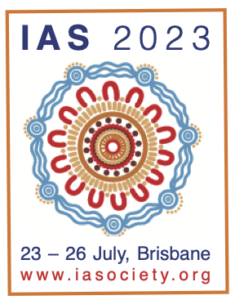IAS 2023: High rates of re-suppression with dolutegravir in the ADVANCE study
1 October 2023. Related: Conference reports, Treatment strategies, Drug resistance, IAS 2023 Brisbane.
Polly Clayden, HIV i-Base
With enhanced adherence counselling, 95% of people re-suppressed on dolutegravir-based ART after viral rebound to over 1000 copies/mL. These findings from the ADVANCE study were presented at IAS 2023.
WHO guidelines currently recommend switching NNRTI-based ART for people with sustained viral load above 1000 copies/mL.
For people receiving dolutegravir (DTG)-based treatment, the alternative recommendation is to provide enhanced adherence counselling and then repeat viral load testing after three months.
The study tested this approach by comparing rates of viraemia and re-suppression in the ADVANCE trial of first-line ART in South Africa.
In ADVANCE, 1053 treatment-naive people were randomised to tenofovir alafenamide (TAF)/emtricitabine (FTC)/DTG, tenofovir disoproxil fumarate (TDF)/FTC/DTG or TDF/FTC/efavirenz (EFV) for 192-weeks. This analysis combined the two DTG arms.
Viral load was tested at four weeks, 12 weeks, then every 12 weeks to week 96, and after that every six months up to week 192. Presenting author Andrew Hill noted that this was probably a lot more than in a standard African treatment programme.
All participants with viral load greater than 1000 copies/mL received enhanced adherence counselling within four weeks.
This study used the following definitions to describe viral load values:
- Viral suppression – viral load less than 50 copies/mL
- Virologic failure (or rebound) – one viral load result of 1000 copies/mL or more at least 24 weeks after randomisation
- Re-suppression – one viral load result less than 50 copies/mL in people with virologic failure who previously achieved suppression (only the first incidence of virologic failure per person is considered)
The analysis used Kaplan-Meier methods to look at time to viral suppression, virologic failure and re-suppression.
This revealed that time to suppression was significantly shorter in the combined DTG arms (4 weeks) compared to the EFV arm (12 weeks). And time to re-suppression was also significantly shorter for DTG (12 weeks) than EFV (26 weeks). (Both p<0.001).
The proportion of participants with virologic failure was similar across arms: combined DTG 12% vs EFV 9% (p=0.343).
Week 24 re-suppression rate was: 88% (95% CI 79 to 95) for DTG vs 46% (95% CI 25 to 72) for EFV. Week 48 rate was respectively: 95% (95% CI 87 to 99) vs 66% (95% CI 40 to 90).
Fewer people stayed on EFV after viral rebound though and a proportion of these switched to a protease inhibitor – Dr Hill explained in questions after the presentation.
There was no integrase inhibitor resistance observed in ADVANCE, nor in a meta-analysis of first-line studies that the investigators performed to compare to this study. When they looked at second-line studies, a small proportion of people developed resistance but the outcomes were unknown.
Limitations of the study include a significant number of people lost to follow up with viraemia and not everyone with viral load greater than 1000 copies/mL was genotyped.
comment
These results are important and have practical implications for people experiencing viral rebound with DTG and for ART programmes. Already, the new South African guidelines recommend that people only switch from DTG if resistance testing shows integrase inhibitor mutations. This is an excellent approach but will clearly rely on access to the tests. This is variable in South Africa and rare in some African settings.
Dr Hill also raised the question of how much adherence counselling and repeated viraemia is needed before it becomes better for someone to switch?
Because phase 3 industry studies switch people with viral rebound fairly rapidly (usually two consecutive viral load tests 400 copies/mL), they don’t look at the potential for re-suppression, and this aspect of an investigator-led study in a close to real-life setting (that likely will simplify treatment delivery) is also worth highlighting.
Reference
Hill A et al. High rates of long-term HIV RNA re-suppression after virological failure on dolutegravir in the ADVANCE trial. IAS 2023. Brisbane. Australia. 23–26 July 2023. Oral abstract 3810.
https://ias.reg.key4events.com/key4register/AbstractList.aspx?e=96&preview=1&aig=-1&ai=52401 (abstract)
This report was first posted on 19 September 2023.


